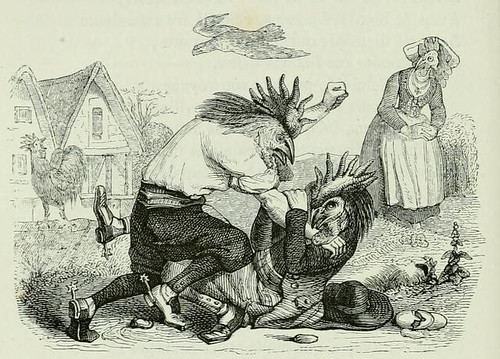HODIE: ante diem quintum Idus Apriles.
GOOGLE BOOKS: Today's Google Books are Harrison's Prolegomena to the Study of Greek Religion and Meazza's Extemporanea poesis.
MYTHS and LEGENDS: The art image for today's legend shows The Danaids; you can also see the legends for the current week listed together here.

TODAY'S DISTICHS and EMBLEMS: All the distichs come with vocabulary lists!
RHYMING DISTICHS: The two new Rhyming Distichs are Sta pes, Sta pes, sta mi pes, sta pes, nec labere, mi pes! / Ni tu stes, mi pes, lectus erunt lapides; and Qui benefactorum, Qui benefactorum non vult memor esse suorum, / Non est laudari dignus, nec dignus amari.
CATO'S DISTICHS: The two new Cato Distichs are Cum te detineat, Cum te detineat Veneris damnosa libido, / Indulgere gulae noli, quae ventris amica est; and Quod tibi suspectum est, Quod tibi suspectum est, confestim discute quid sit; / Namque solent, primo quae sunt neglecta, nocere.
MARTIAL'S DISTICHS: The two new Martial Distichs are Murices, Sanguine de nostro tinctas, ingrate, lacernas / induis, et non est hoc satis, esca sumus; and Jus tibi natorum, Jus tibi natorum vel septem, Zoile, detur, / dum matrem nemo det tibi, nemo patrem.
VERINUS DISTICHS: The two new distichs by Verinus are Mores Parentis, Saepe patris mores imitatur filius infans: / Qualis erat mater, filia talis erit; and Quales Principes, Tales Populi, Si studia et mores populi cognoscere curas, / Res facilis: vitam principis inspicias.
OWEN'S DISTICHS: The two new Owen epigrams, with Harvey's English versions, are Anagramma: Galenus Angelus, Angelus es bonus anne malus, Galene? Salutis / Humanae custos angelus, ergo bonus; and Foeneratoris Apologia, Quo mihi divitiae, si non conceditur uti? / Aera nitent usu, me iuvat usus opum.
CAMERARIUS'S EMBLEMS: The two new emblems are Quantum Mutatus Ab Illo, Corniger ut blandus fit amictus fronde, at inertem, / Frugi vix facias, ni bene pressus eat; and Dulce Est Desipere In Loco, Tempora stultitiam, gravitatem saepe vicissim, / Deposcunt; prudens desipit atque sapit.
ROLLENHAGEN'S EMBLEMS: The two new emblems are Victrix Fortunae Sapientia, Victrix Fortunae, Sapientia sancta Tonantis / Durat et, exsuperans cuncta pericla, viget; and Aut Mors Aut Vita Decora, Alterutrum optandum est aut mors aut vita decora; / Turpe fuga vitam quaerere: malo mori.

TODAY'S MOTTOES and PROVERBS:
TINY PROVERBS: Today's tiny proverb is: Grata novitas (English: Novelty is pleasing).
3-WORD MOTTOES: Today's 3-word verb-less motto is Multum, non multa (English: Much, not many - a proverb against multitasking).
ANIMAL PROVERBS: Today's animal proverb is Si cantes asino, crepitus tibi reddet ab ano (English: If you sing to a donkey, he'll return you a fart from his rump).
POLYDORUS: Today's proverb from Polydorus is: Non in solo pane vivit homo (English: Man does not live by bread alone).
PROPER NAME PROVERBS: Today's proper name proverb from Erasmus is Zaleuci lex (English: A law of Zaleucus; from Adagia 2.10.63 - Zaleucus of Locris was supposedly the author of the first Greek law code, which was proverbial for its severity; for example, if someone was convicted of adultery, their eyes were gouged out as punishment).
GREEK PROVERBS: Today's proverb is Ὄνος λύρας ἀκούων κινεῖ τὰ ὦτα (English: When the donkey listens to the lyre, he moves his ears - a good proverb to go with the Latin proverb above).
TODAY'S FABLES and STORIES:
ANECDOTE OF THE DAY: Today's anecdote is Dianae Templum, the temple of Diana.
FABULAE FACILES WIDGET: The fable from the Fabulae Faciles widget is Avarus et Aureorum Sacculus, a wonderful story about a miser and his money (this fable has a vocabulary list).
MILLE FABULAE: The "chunk" of Mille Fabulae et Una today is Fable 701, Pulex et Abbas, through Fable 710, Malus Exspoliata, including Quercus et Glires, the story of the oak and the dormice - probably my favorite of all the ecological Aesop's fables!
AESOP IN ENGLISH VERSE: Today's fable from the English verse widget is The Sculptor and Mercury, a story of the fate of Hermes in the hands of a sculptor.
MILLE FABULAE WIDGET: The fable from the Mille Fabulae et Una widget is Galli Inter Se Pugnantes, a story in which victory turns out to be defeat in the end, and defeat turns into victory: Galli duo, ut eorum mos est, inter se de ducatu gallinarum acerrime certabant. Qui superior in pugna fuerat, alarum plausu vocisque cantu se victorem fuisse significans, Venere et otio emarcuit. Victus autem, a conspectu gallinarum profugiens, cum cornicibus et pavonibus sese quotidie pugnando exercebat; inferendi vitandique ictus artem ediscebat. Qui, ubi se satis instructum vidit, rediens, adversarium ad pugnam provocatum nullo negotio superavit.
